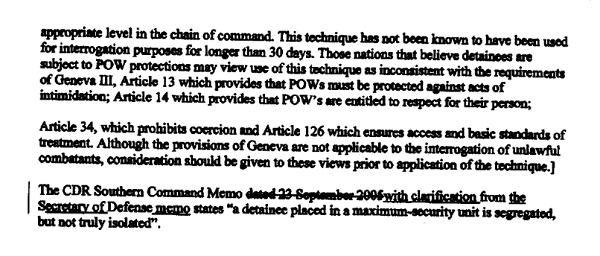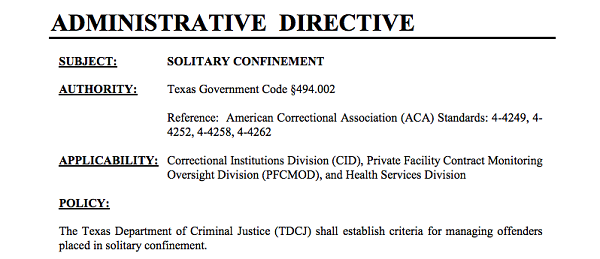For a term as familiar as “solitary confinement,” the official record is impressively adept at calling the practice just about anything else. In Texas, though, the phrase is used and the practice utilized — a lot.
But admitting the problem is one of the first steps to solving it, and that Texas doesn’t hide behind terminology makes it a lot more straightforward to even ask questions about the practice. It’s the sort of simplicity that is lacking in a so many other jurisdictions.
Take, for example, the Bureau of Prisons, whose Director, Charles Samuels, recently confused Senators and the public alike when he stated, “We do not practice solitary confinement.”
Solitary confinement critics have a litany of reasons for why the practice is the worst, not the least of which is that it qualifies as torture under the Geneva Conventions, and Directors Samuels’ semantic specificity highlighted one of the ongoing troubles with getting the powers that be to deal with a condition that draws international criticism. Consider this page from the Guantanamo Bay interrogator’s operations manual regarding isolation:

Juan Méndez, the UN Special Rapporteur on Torture puts it very clearly “Segregation, isolation, separation, cellular, lockdown, Supermax, the hole, Secure Housing Unit … whatever the name, solitary confinement should be banned by States as a punishment or extortion technique,”
The data on solitary confinement has long been bad, with noticeably worse recidivism rates and documented deterioration of mental states. According to a February ACLU report, Texas released 1,243 people directly from solitary confinement, where they had almost no contact with others, into the public, free-world population, a phenomenon that takes place across the country with unfortunate effect.
Fortunately, having the policies under which inmates are held can help find the terms and reasons for their solitary incarceration. In Texas, requests have been made for data regarding solitary prisoners held for various reasons under variously-described labels - requests that would be significantly more difficult to make in states with less straightforward language:

Help MuckRock narrow down terms and technicalities in your state, so that differences of vocabulary don’t keep preventing access to information necessary for informed policy-making. Reach out to info@muckrock.com and let us know what you’re interested in.
Image by Justin Ennis via Flickr and is licensed under CC BY-SA 2.0




